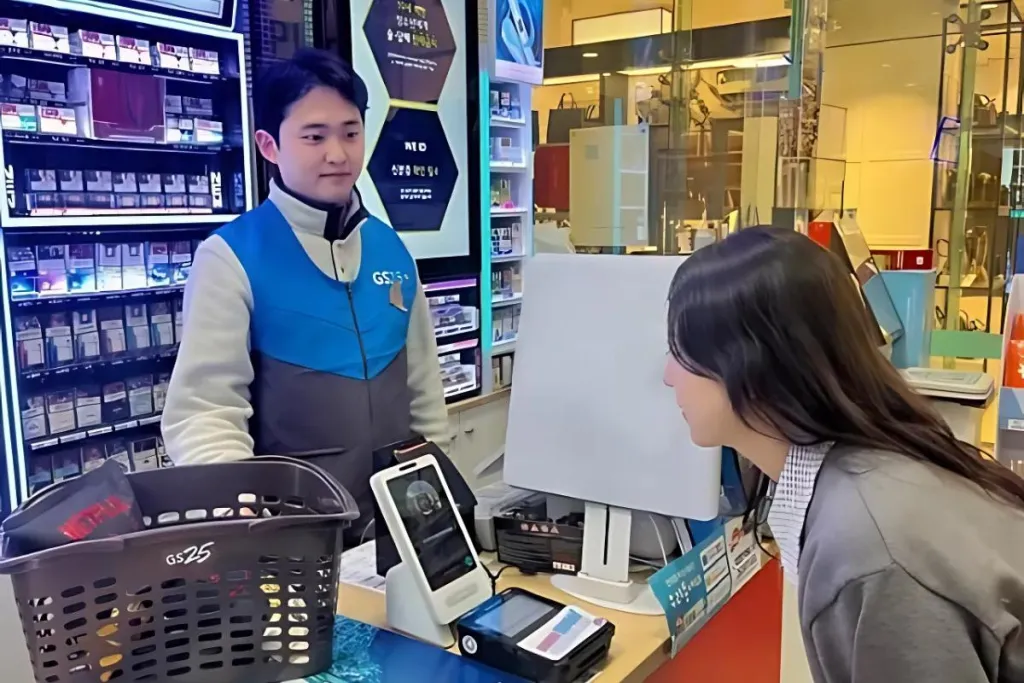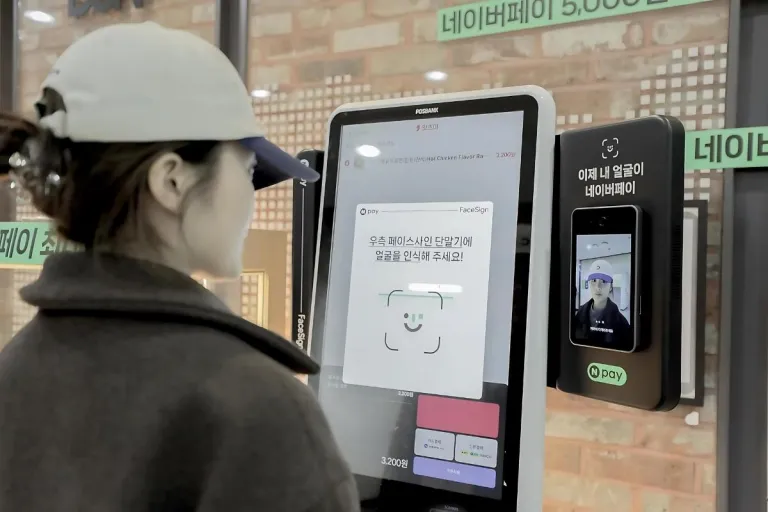Not just Boracay...
Pay-by-Face in Korea: How it Works, Where to Use it, and Tips For Muslim Travellers

Picture this: you walk into a Seoul convenience store, grab a bottle of banana milk and a kimbap, head to the counter… and instead of reaching for your wallet or phone, you just look at the screen. One second later, payment done.
This isn’t a sci-fi scene — it’s South Korea’s new Pay-by-Face technology, and it’s changing the way locals shop. But can travellers — especially Muslim travellers — join in on the fun? Let’s break it down.
From Airport checks to everyday shopping
Facial recognition tech in Korea isn’t new. Locals have been using it for years to unlock smartphones or breeze through airport immigration. But now, it’s stepping into the payments world — and quickly gaining traction.
Shinhan Card was the early pioneer, testing facial payments back in 2019 at its headquarters cafeteria, a convenience store on Hanyang University’s campus, and select Homeplus supermarkets. But there was one big catch: you had to register your face in person at a bank. For many, that was a hassle, and public trust in the technology was still low.
Fast forward to today, and it’s the fintech giants who are taking facial payments mainstream.
Naver Pay and Toss lead the charge
 Image credit: Naver Pay | Official Website
Image credit: Naver Pay | Official Website
In 2024, Naver Pay started offering facial payments at university cafeterias, letting users sign up completely through the app — no bank visit required. Later this year, they’ll roll out their own payment terminals, which could push adoption even further.
Then came Toss, launching its service in February 2025. Instead of waiting for stores to buy new machines, Toss gave away its own payment terminals — complete with subsidies — to merchants. The strategy worked. Today, over 160,000 merchants across Korea use Toss terminals, and more than 20,000 stores in Seoul have activated facial payments, including big-name convenience stores and gas stations.
Even Lotte Card is getting in on the action, with plans to let people pay at airports using facial data stored with the Korea Airports Corp.
How it works — Step by step
For locals, paying with your face is as easy as:
Download the Toss or Naver Pay app.
Register your face by taking a selfie in the app.
Link a Korean bank card or account.
At the store, look into the terminal’s camera.
Confirm the payment (sometimes with a PIN).
The whole process takes about a second — quicker than tapping a card.
Can travellers use it?
Here’s the catch: tourists can’t use Pay-by-Face (yet). To register, you need:
A Korean phone number
A Korean bank account or card
An Alien Registration Card (ARC) or Korean ID
That means even if you’re just visiting, you won’t be able to set it up unless you’re a long-term resident.
What Muslim travellers can do instead
If you can’t use facial payments, don’t worry — Korea has plenty of easy alternatives:
T-money card – Great for buses, trains, convenience stores, and even attractions like palaces or Lotte World.
International credit/debit cards – Accepted in most hotels, large shops, and cafes (though not always in smaller businesses).
Cash (KRW) – Still useful at halal food stalls, traditional markets, and rural areas.
For Muslim travellers, this means you can still enjoy a seamless payment experience in big cities while having cash ready for smaller halal eateries or prayer-friendly cafés.
Privacy and security concerns
While Pay-by-Face is ultra-convenient, it’s not without risks. Facial data is sensitive — if compromised, it’s nearly impossible to “reset” your face. That’s why companies are investing heavily in secure, fraud-resistant systems.
There’s also the competition factor. Since each company keeps its own facial database, merchants would need multiple terminals to work with different providers — something most won’t do. Experts say this could lead to a “winner-takes-all” market.
Also read: Apple Pay Coming to Korean Public Transport: What Muslim Travellers Should Know
Final thought
Pay-by-Face is futuristic, fast, and incredibly convenient — but for now, it’s a locals-only perk. If you’re visiting Seoul, you’ll still be pulling out your T-money card or credit card for that iced latte at the halal café.
Still, the next time you see someone in a GS25 pay with nothing but a smile, you’ll know you’ve had a glimpse of Korea’s cashless future.
Published at
About Author
Aimi Zulkiflee
Subscribe our Newsletter
Get our weekly tips and travel news!
Recommended Articles
10 Best Halal-Friendly Destinations in The Philippines for Muslim Travellers 10 Best Hotels Near Goyang Stadium: A Guide for K-Pop Fans Heading to South Korea! Traveling abroad just to see your favorite idol perform is the ultimate fan goal
10 Best Places for Muslim Travellers to See Tulip Festivals in 2025 Fun Fact: Tulips didn’t actually come from the Netherlands but Türkiye!
10 Halal Anime Food Guide for Muslim Travellers in Japan Muslim-friendly versions of popular anime dishes across Japan!
Top 10 Popular Muslim-Friendly Destinations to Visit in 2025 Our schedules are packed, buddies!
Latest Articles
Mt. Fuji’s Iconic Cherry Blossom Festival Canceled for 2026: Essential Updates for Travelers Overtourism and tourists misconduct are the reasons behind this decision.
Seoul’s Majestic Palaces Open Their Gates for Free This Mid-February Plan your budget-friendly trip now!
9 Most Instagrammable Cherry Blossom Spots in Jeju: Your 2026 Spring Guide Ready to experience Jeju’s spring in full bloom?
Best Places to Stay in Kyoto 2026 : 10 Best Ryokan Hotels with Traditional Japanese Style the ultimate way to feel Kyoto’s old-world charm
Taiwan Cherry Blossom Guide 2026: Top 10 Spots, Forecast, & Hot Springs cherry blossom season is back!

